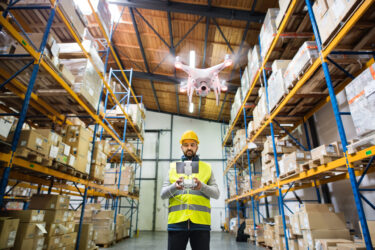

According to Maersk and IBM, document processing & administration cost 20% of the transportation cost. Blockchain-based platforms help to reduce it significantly. The naval shipping industry, which moves about $3.2 trillion of goods worldwide, has been a notable laggard in digital development. Read more about blockchain potential in the Maritime industry.
Potential of blockchain
Blockchain is a rapidly developing technology. It is carrying the great potential to build new business models, generate more revenues, increase business transparency or eliminate fraud. You can also know the name distributed ledger – it is a modern version of a centuries-old ledger. It enables multiple parties – who often don’t know or trust one another – to record information in a permanent, immutable, tamper-proof, and transparent manner on a decentralized digital ledger and a distributed system without the aid of a central authority. Trustless consensus algorithms are securing the integrity of the blockchain. They are guarded by cryptography, making it impossible to append or modify historical data illegally.
The growing popularity of blockchain technology
The popularization of blockchain technology started with cryptocurrencies. Currently, however, this is only a fraction of its possible applications. You can find blockchain digital technology, consisting of a chronological, impossible to change or delete data record, in banking, finance, healthcare, energy, and real estate.
Attendees at the World Economic Forum in Davos (2019) recognized blockchain as the most important innovation since the inception of the internet. Gartner’s analytical company has determined the global value of blockchain solutions at over $176 billion by 2025 and predicts that it will exceed $3.1 trillion by 2030.
Using blockchain in Maritime industry
In the Maritime sector, blockchain facilitates the container’s location. It shows the status of customs documents, sea waybills, or other documents as well. By connecting all operations and partners in the transport process, improves the work and organization of activities, reduces operating costs, and facilitates monitoring. Customs and border guards are also using this technology, providing themselves with the information they need to analyze threats.
Logistics players have difficulties getting a clear idea of the benefits of successful blockchain adoption. At the same time, consultants and academics worry about the technological maturity of blockchain. Second, the adoption of blockchain technology into maritime logistics has shown that the industry’s competitive edge is still highly influenced by economic factors, mostly related to financial and time-related aspects.
Blockchain technology adoption
Blockchain technology adoption enhances the competitiveness, efficiency, and sustainability of the targeted domains. The prototype, which is the subject of this proposal, will reduce the documentation administration time. What’s more, it will reduce the paperwork and the number of paper documents, making it easier to move to digital since we provide a thrust environment for its circulation.
The availability of the blockchain system for the Maritime market participants allows for a lot of information exchange and complete transparency. Transactions may occur outside the centuries-old system – without the participation of public trust institutions, directly between the parties that conclude them. Over time, many intermediaries will be driven out of the market because they will not be needed.
Summary
Digital data records allow us to limit paper documents. Thus, problems in the global supply chain system are less frequent, including inaccurate information, delays due to data entry speed, and a lack of transparency. It allows to reduce costs, and as experts emphasize, about 80 percent of world trade uses maritime transport. Blockchain technology has the potential to increase trust among trading partners. They share the record of all transactions online, and authorized parties can access the data in real-time.
It is essential, among others, for customs and border services. They receive shipping details as soon as the containers leave the port of origin, so they have much more time to prepare for cargo reception, allowing for more accurate and adequate inspections and catching fraud and counterfeiting. It increases security and increases the efficiency of customs clearance and controls.
We are pleased to announce the international collaboration between Polish and Romanian companies working together to accelerate blockchain technology adoption in the Maritime industry.




